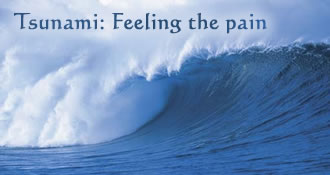
On the first day of the tsunami disaster in Southeast Asia some news anchor said, "The death toll is now over 10,000 including at least three Americans."
Is that a sane statement? Is it correct or proper for us to ask, were there any Americans? Jews? Israelis? Is it normal that the world took notice of the Belgians, action figures and supermodels?
Popular thinking says no. It's not politically correct to consider the three Americans significant in the face of tens of thousands of other human beings.
But, on second thought, everything exists in layers and degrees. For a close friend we hurt more. For a family member the pain is greater yet. Indeed it would be unrealistic and un-human to expect one to feel differently.
In the case of this tsunami, the devastation is so massive that we need something to "bring it home." Otherwise, it remains a terrible tragedy half a world away.
So we find even a single individual among the victims that brings the pain to a personal level.
The really important question is: Now what? Now it's personal. What happens next?
That's where this selective grieving can go either way. If we continue to grieve only for those dear to us then we've failed. But if once we have this feeling of grief over a person we relate to, we then extend it to the rest, that's moral and kosher and humane.
The "particularism" is the gateway to concern for all.
If we grieve indiscriminately for all, the feeling is too amorphous and intangible. We need to identify the victim with ourselves. Impersonal grief is unreal. So make it personal. How? By associating it with a personal grief and then extending it from there.
The story is told of a chassid who wept when he realized that he didn't cry over the untimely passing of his neighbor's child as much as he did over the passing of his own son. Even after all his life-long effort to ingrain the love of his fellow in his heart.
That chassid was obviously on a very high level, which cannot be expected of you and me. But the lesson is useful. He only discovered the incompleteness of his grief for the neighbor's loss after he was able to compare it to his own.
The pain of others should be as real to us as our own. That is the ideal we must aspire to. And the place to start is the pain that is closest to our hearts.

